PLATOS FABLE

NEW FORUM BOOKS  Robert P. George, Series Editor
Robert P. George, Series Editor
A list of titles in the series
appears at the back of the book
PLATOS FABLE
ON THE MORTAL CONDITION
I N SHADOWY TIMES

Joshua Mitchell
PRINCETON UNIVERSITY PRESS
PRINCETON AND OXFORD
Copyright 2006 by Princeton University Press
Requests for permission to reproduce material from this work should be sent to Permissions,
Princeton University Press
Published by Princeton University Press, 41 William Street, Princeton, New Jersey
08540
In the United Kingdom: Princeton University Press, 3 Market Place, Woodstock,
Oxfordshire OX20 1SYvAll Rights Reserved
Library of Congress Cataloging-in-Publication Data
Mitchell, Joshua.
Plato's fable : on the mortal condition in shadowy times / Joshua Mitchell.
p.cm. (New forum books)
Includes bibliographical references (p.) and index.
eISBN: 978-1-40082-717-6
1. Plato. Republic. 2. Political anthropologyGreeceHistory. 3. Philosophical anthropologyGreeceHistory. 4. Classical literatureHistory and criticism.
I. Title. II. Series.
JC71.P6M56 2006
321'.07dc222005016653
eISBN: 978-1-40082-717-6
British Library Cataloging-in-Publication Data is available
This book has been composed in Sabon
Printed on acid-free paper.
pup.princeton.edu
Printed in the United States of America
1 3 5 7 9 10 8 6 4 2
If man were wholly ignorant of himself he would have no poetry in him, for one cannot describe what one does not conceive. If he saw himself clearly, his imagination would remain idle and would add nothing to the picture. But the nature of man is sufficiently revealed for him to know something of himself and sufficiently veiled to leave much in impenetrable darkness, a darkness in which he ever gropes, forever in vain, trying to understand himself.
Alexis de Tocqueville, Democracy in America
The wisdom of Plato is not a philosophy, a search for God by means of human reason. Such a research was made as well as it can be by Aristotle. Platos wisdom is nothing but an orientation of the soul toward grace.
Simone Weil, Intimations of Christianity
CONTENTS

PREFACE

AN APOLOGY, of sorts, would be in order if I were here offering yet another interpretation of Plato. Perhaps in an earlier agesay, in the aristocratic agefurther justification for what I have done would not be required, since this offering, small though it may be, would be received under the category of commentary rather than interpretation. And while that would not hallow what I have provided here, it would certainly authorize it.
We do not live in such an age, however; and so a warrant of a different sort is required, one that vindicates a project such as this one on more imaginable grounds. Commentaries, which presume a durable tradition, within which the conventions of scholastic conduct remain tacit, hold little sway in an age that has no enduring interest in tradition. And interpretations, at their worst, fall into the category of mere personal opinion, for which no one concerned with science in its fullest sense should have patience. Knowledge is not soliloquy.
At their best, of course, interpretations are far more than mere personal opinion, as a perusal of the secondary literature on the history of political thought demonstrates. At their best, such works warrant our attention less because they are perspicuous articulations of the original authors intention than because they provide a resume of a coherent, even if deeply troubled, moment of history, when for a time thinkers labored under a set of prejudices that set the boundaries of their generation. In their more distinguished expressions, the fecundity of a original text, and the light cast on it by its interpreters, unwittingly cooperate to divulge the contours of a historical moment that is fleetingas all are. Here, contingent interpretation is correlative to canonical authority. Together they issue that third thing: an authoritative self-understanding that holds sway for this or that community, here and now. Somewhere between the accidents of personal opinion and the Timeless lies interpretation.
While interpretation of this sort is certainly more than mere personal opinion, its compass remains more restricted than our aspiration, hushed though that might be. In the terms of Platos fable, such interpretation corresponds to the passing shadows in the Cave that are first identified by the cleverest of the prisoners below. For a time, a coherent world is brought into focus by their efforts, and then shifting light and the transience of all things conspire to wreak havoc with their labors. Suddenly, to look at their work is to look back; for now new shadows loom, which call forth new interpretations.
This melancholy of knowledge, which always seems to reach beyond its grasp, is dignified, even if not redeemed, by historicisms allegation that the owl of Minerva flies only at dusk, that wisdom is the purchase that looking back grants. Theologically, the loss of innocence is a retrospective affair, known only in hindsight, on the occasion of being thrust into the world of time and of death. Hegel, the first systematic architect of historicism, built upon this theological foundation, and so it seems fitting to bring it to our attention here. And in fairness to Hegel, the contribution of historicism is not the relativism of all knowledge, but rather the hazard that the historical moment in which we dwell gives us the only purchase we will ever have on the shadows that have already passed before us.
Alternatively, the melancholy of knowledge may be averted by philosophy, which begins with the passing shadows in the Cave, only to leave them behind. Philosophy is, after all, para doxa: against opinion, against the timely. Philosophy ascends through timely opinions, unsullied, to the Timeless. As such, it knows nothing of mere personal opinion, interpretation, or the wisdom that comes only at duskall three of which are species of timeliness that grant only fleeting satisfactions, and then quietly succumb to the sting of death.
So specified, however, philosophy altogether evades the central problem of the Republic, namely, the respect in which dimly lit reason is incapable of ascending to the Timeless; for if anything is evident throughout this fabulous account, it is that none of his interlocutors have really understood what Socrates has said. In this fable in which there is incessant agreementYes, I concur, You are right to say that justice is the better course, How could one think otherwise, and so onno one really understands Socrates. What are we to make of these misunderstandings about which nothing is said?
It will be noted that Plato wrote esoterically, cognizant that only the few can come unto knowledge. True though that may be, however, this insight has provided a warrant for a kind of Bolshevism of the mind, by which the inevitable and intractable situation that the
Next page
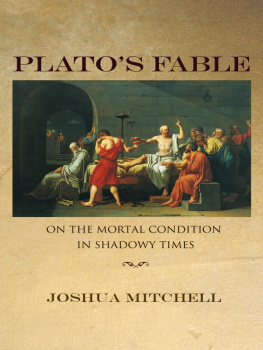
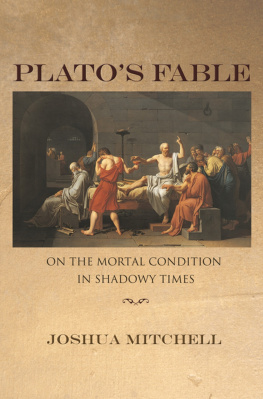
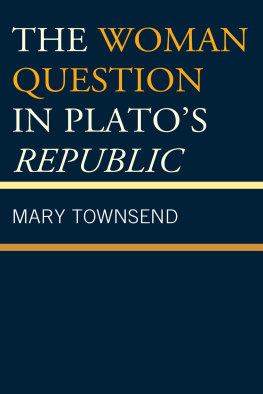

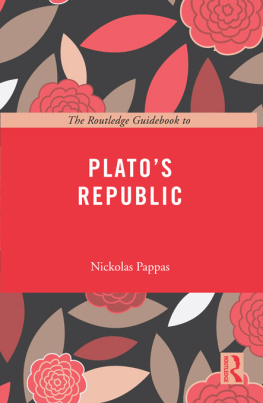

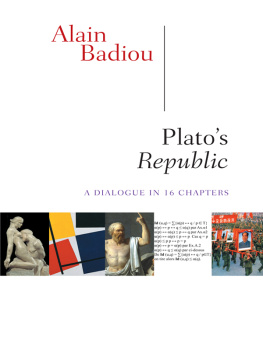
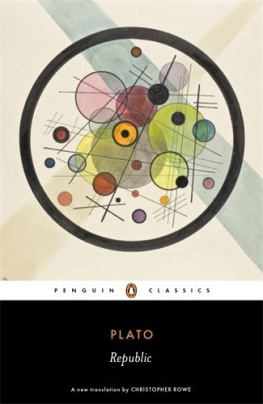

 Robert P. George, Series Editor
Robert P. George, Series Editor

